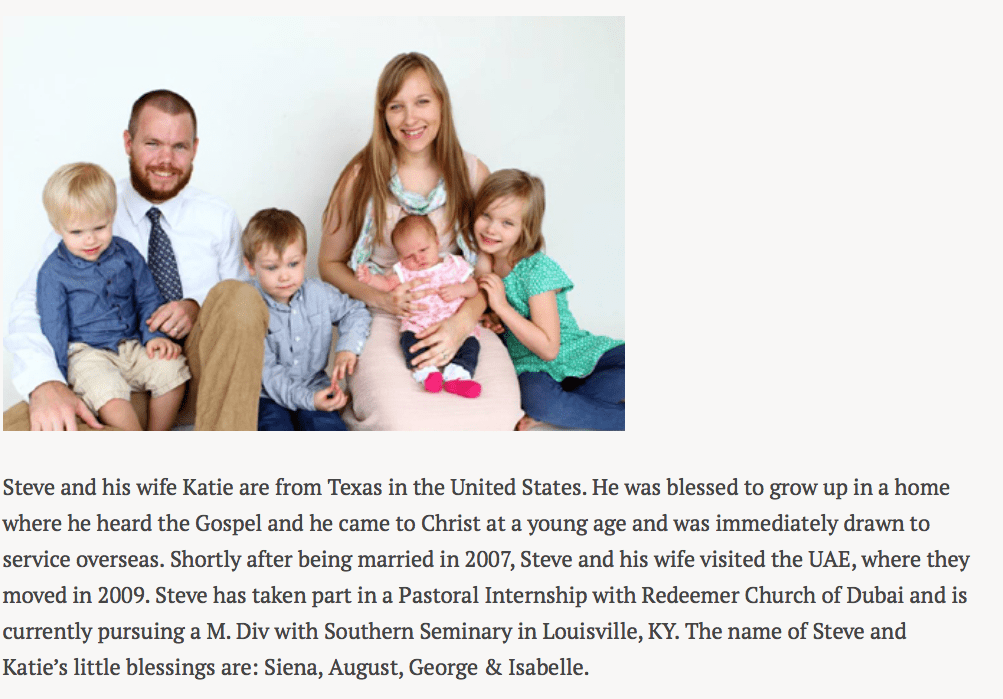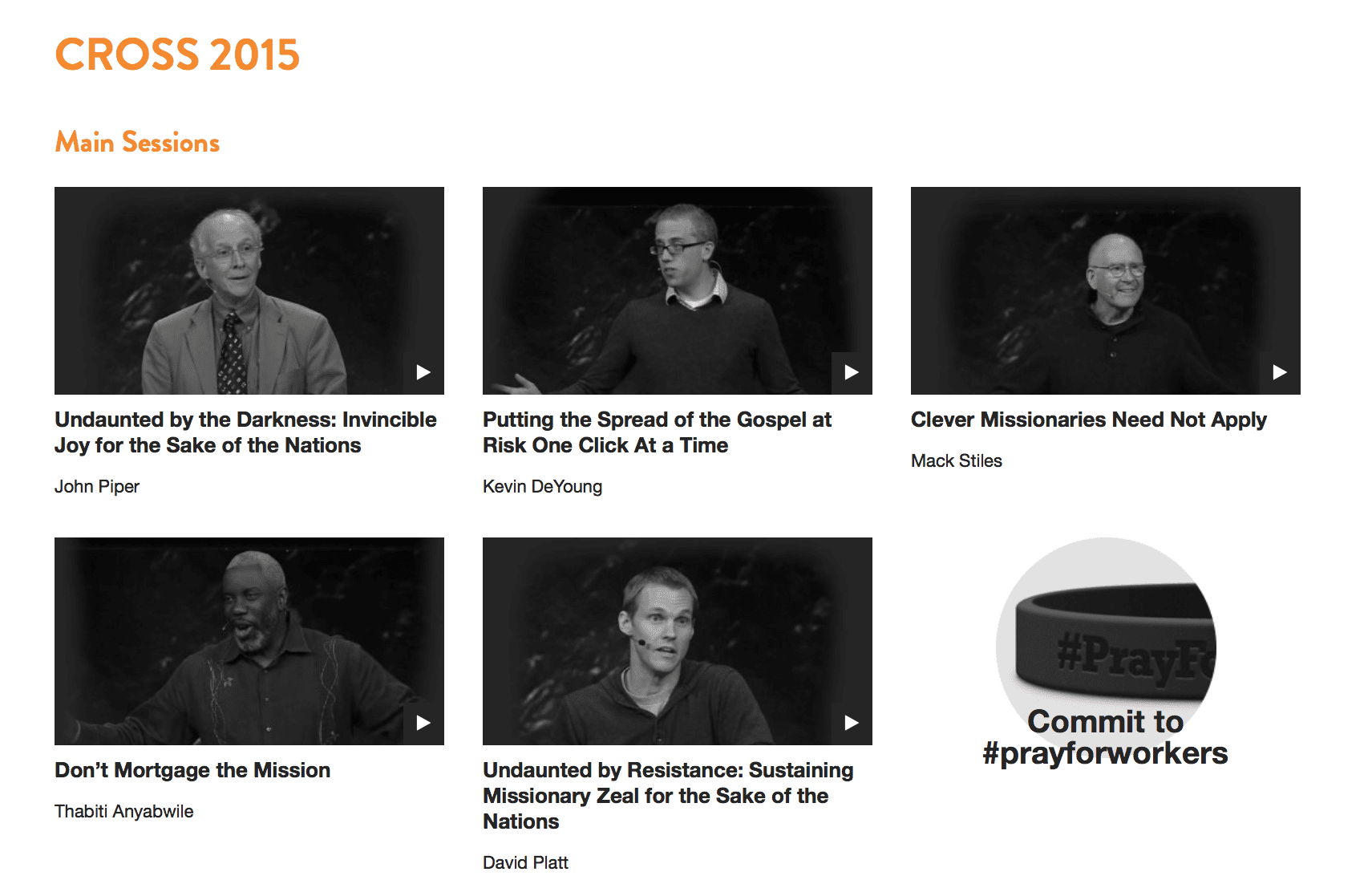
“God knows exactly who should stay and who should go. All the inertia is for staying. I am lifting my voice for going. There is not one chance in a million that too many will go. I hope you will be one of them.”
-John Piper, “God’s Call To Leave This American Mess” (Link)
In what would be a stunning development it appears both the Gospel Coalition and 9Marks are moving away from being a mouth-piece for celebrity Christian “leaders.” Over the course of the last week, both para-church organizations have featured articles written by obscure pastors of very small churches in the United Arab Emirates. Last week the Gospel Coalition featured an article by Josh Manley, senior pastor of the Ras Al Khaimah Evangelical Church in the United Arab Emirates. You can read my article about this here.
Now 9Marks has featured an article written by Steve Jennings, pastor of Immanuel Church of Fujairah in the United Arab Emirates. I have never attended services at either one of these churches, but my best guess is they both have about 50 members. Both churches are part of what I would term an informal confederation of five Evangelical churches in the UAE. These five churches are functionally Baptist; all are 9Marks compliant, including the obligatory requirement to sign a member contract prior to being allowed to become a member.
Jennings informs us via his bio on his churches website that he is pursuing an M. Div with Southern Seminary in Louisville, KY. I assume he is referring to Southern Baptist Theological Seminary. I am told that “Southern Seminary” is how the elect refer to it. Perhaps they find it “unhelpful” to publicize the fact that it is a Baptist seminary?

The title of Jennings’ article is “Stop Sending Missionaries: Why More Isn’t Always Better.” I would recommend you read the article, it can be found here. The premise of the article is that there once was a shortage of missionaries, the pendulum has now swung the other way and too many missionaries have arrived, and many of them are poorly trained misfits who do more to harm the cause of Christ than help. Says Jennings:
“A lot of people are going to the nations who, frankly, shouldn’t be going—at least not yet.
Here’s the question I wish more churches would consider: Why would you send someone to plant churches abroad who you would never hire as a pastor or nominate as a lay elder? Why does it seem that “passion” rather than proven faithfulness is the main criterion for sending men and women to support those church planters? Why on earth is the bar set lower for the frontlines than it is for the local church?
The Great Commission is immense, and just like any immense task it requires vision, dedication, and a lot of manpower. That being said, there are many times when I want to stop and say to the Western church: “Stop sending them! Stop sending under-qualified missionaries!””
If Jennings claim can be believed, that is, if there is an excess of unqualified missionaries arriving in countries in the 10/40 window, then why are the usual cast of gospelly celebrities aggressively pushing for thousands more of young college kids to hit the mission field?


https://vimeo.com/118178300
What really confuses me is David Platt is leading this missionary recruitment drive. This is the same David Platt who is Director of the SBC International Mission Board. As the Director, Platt recently announced that the SBC missions budget, since 2010, has spent $210 million more than what they have collected. Because of this, Platt said, they will need to cut 600-800 individuals from their payroll. (See my article on this subject here.) Platt is looking for many veterans on foreign mission fields to take an early, voluntary retirement. (Some have suggested this is to purge the old guard and replace them with a new crop of missionaries that hold to the same doctrines that SBTS and Southern Baptist leaders are advocating, that is, Neo-Calvinism.) I am not that skeptical. I take Platt at his word; he is attempting to get the budget under control. That being the case, how does Platt think these thousands of new missionaries that the CROSS Conference is hoping to enlist will be paid?
Back to Jennings article – he states:
“If you would not make a man an elder in your church, then don’t send him to plant churches anywhere, much less overseas. If you are sending someone who isn’t elder material or isn’t quite there yet, then I would suggest sending them somewhere with an established church where you know their spiritual development and ministry will be seen by faithful shepherds.”
Jennings then goes on to list a litany of characteristics potential missionaries should possess. Basically, what he defines are the biblical qualifications for an elder. I wish Jennings would give us his definition of what a missionary is. It seems he thinks it is somebody like himself. He came to Dubai as an intern under David Furman, senior pastor at Redeemer Christian Church of Dubai, and shortly thereafter was sent to Fujairah to plant a church. I would agree that an individual who is pastoring a church needs to fulfill the requirements Jennings suggests; however, I would not technically classify any of these five 9Marks pastors in the UAE as missionaries. Platt and his cohorts, in the CROSS Conferences, continually challenge the young college students to go to foreign lands to minister to people groups who have never heard the Gospel. The five 9Marks pastors in the UAE rarely come in contact with local Emirati citizens. Their job consists mainly of pastoring churches of expat Christians. Attempting to proselytize Muslims is against the law. From all indications I have seen and read the professional missionaries Jennings is advocating for have been totally ineffective in leading Muslims to the Lord. One must wonder if the untrained individuals Jennings laments about showing up in the UAE could do any worse than the professionals? Listen to what John Folmar, Senior Pastor of UCCD, said at CROSS Conference 2013:
Additionally, sending “missionaries” (as we historically think of them) to many countries in the 10/40 window is not practical or legal. The only option in many Muslim countries, and countries such as China, is to go as a “tent-maker;” that is, to go to a country with a work visa, gainfully employed. As Folmar mentioned above, it is very hard to make in-roads among the Muslim population. They are not going to visit a church.
“Despite several decades of Christian witness and presence in the UAE, it has often been observed that the Church seems to have had little impact on Emirati people in terms of conversion from Islam to Christianity. In her masterly survey of American missionary work in Arabia, Emirati scholar, Fatma Al Sayegh highlights where the Christian influence was effective. She comments:
The missionaries influence was not just limited to the medical field. New ideas such as the importance of modern education, dignity of labour, the value of hand crafts (shunned by the Arabs) and appreciation of amenities of modern life were introduced by the missionaries.
But she also highlights the reason why the Christian missionaries did not succeed in a mass movement from Islam to Christianity. She explains that the missionaries encountered a people who were:
Tenaciously bound to their faith. Islam was not only a religion but also a way of life. By becoming a Christian, the Arabs believed, they would not only be cut off from the rest of society, but also change their allegiance. The feeling of rejection and social boycott explained the insignificant number of converts.”
Andrew Thompson, “Christianity in the UAE: Culture and Heritage” pages 32-33.
I think the closest comparison I have that American Evangelicals would understand would be attempting to convert Mormons. If you were to plant a church in Salt Lake City you would not have Mormons coming in droves to attend your church service. Even if you developed a friendship with a Mormon and he was attracted to Christianity it would be very hard for him to convert. Not only would he have to go against all he has been taught, but he would also have to give up all his family and social contacts. He would literally be ostracized from all his Mormon friends and family. Multiply this by about 100 for the difficulties a Muslim would face if he converted to Christianity. Muslims can be put to death for converting to another religion.
In my opinion, the only way to share Christ with Muslims is through sincere friendships. These friendships can take years to cultivate. As with any person, when they see you have a genuine love and concern for them they will begin to trust you and open dialogues are possible. Even then you may never see any fruit from your efforts. This is why I question Jennings’ assertion that only extremely knowledgeable Christians able to teach, refute error, etc. should be coming to places such as Dubai. Phooey, I say. If you love the Lord and have a burden for Muslims, get a job in Dubai and move over here. Once here, intentionally seek a friendship with an Emirati. You may make only one such friend. That is enough.
“Other members of the mission made their way to the Trucial States in 1901. One of them, the Rev James Moerdyk, stayed in Sharjah and rented a home which he called the ‘first Christian house in Sharjah!’ Although he was not medically qualified, Moerdyk wasted no time in setting up a treatment clinic. Al Sayegh notes that many people came to him because they believed all missionaries were medical men. The Bibles and other religious literature given to them did not act as a deterrent. Nevertheless, Moerdyk commented on the resistance to the Bible wherever he went as it was believed by the local Muslims to be a forbidden book. It soon became clear that the people welcomed the medical ministry but had little time for the religious messages of the missionaries.
Moerdyk stayed for two months, the longest any American missionary had stayed on the Coast and he boasted that he now knew the land and her people. He categorized the people into three groups: ordinary people and slaves, spies, and open enemies who were eager to speak evil about the Christian and his Bible. His open efforts to proselytize led to the local ruler forbidding his citizens to rent space to him and the imams told their faithful to boycott him and burn any of his materials.
There is deep suspicion that the accounts of Moerdyk had been falsified in order to impress his prayer supporters back in the USA. Al Sayegh points out that in a country where more than 95 percent of the population were illiterate, Bible sales seemed oddly robust!”
Andrew Thompson, “Christianity in the UAE: Culture and Heritage” pages 72-73.
“The Roman Catholic Church has helpful guidelines which identify four kinds of interfaith encounters. They insist that interfaith dialogue should not be the domain for the specialist, but for anyone and everyone of faith. According to the Catholics then, the four main areas of dialogue are life, organizations, Education and Salvation.
Dialogue of Life
Muslims and Christians live and work together, love, suffer and die. The distinctiveness of this dialogue is not to be found in its purpose, but in a pattern of behaviour by which persons are welcomed, their speech heard and their differences accepted. To behave in this way, we do not need to be great scholars or theologians, or be advanced in the way of holy living. It is enough to be people of faith and hope, of good will and charity.”
Andrew Thompson, “Christianity in the UAE: Culture and Heritage” pages 161-162.
For further information:
Living in Secret As a Catholic in Saudi Arabia
A Platt-Full of Trouble: The IMB’s Fiscal Crisis
Paige Patterson Declares War against the IMB: “How Many Wars You Got Left Boy?
LAMP Theological Seminary
https://vimeo.com/121078068